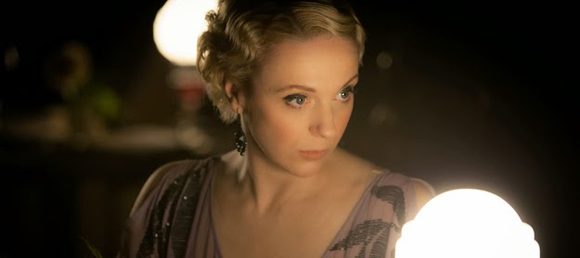Steven Moffat Talks BBC Sherlock‘s “Female Perspective”
Oh Really?

We had our own little open discussion thread the day after the Sherlock season three finale aired in the US, but I would like to formally invite all our readers to hash out their thoughts on Sherlock‘s most recent season here, too. Something tells me the subject of these quotes from Steven Moffat—the importance of the show’s “female perspective”—will inspire some strong opinions.
SPOILERS are behind the jump and in the comments. Also: I want to make completely clear that the article you’re about to read isn’t exactly favorable of Moffat. If you’re one of those people who doesn’t like to read negative opinions of him and writes comments like “Why does everyone on this site hate Moffat?! If you don’t like the show, don’t watch it!” (yes, there are a few), I invite you not to read further.
“One of the interesting things about Sherlock, as a show,” said Moffat in an interview with Collider, “is that we want to stick very close to the style and approach of the original stories, but the one big problem is that there are no women, and what women do turn up are not that great. They’re a bit boring. Not all of them, but most of them are not very interesting.” He goes on to single out Molly Hooper, who wasn’t in Arthur Conan Doyle‘s original stories at all, and landlady Mrs. Hudson, who “doesn’t really speak in the original.”
(I would like to take a moment to point out that another thing that’s changed since Victorian London is that it’s generally viewed as less acceptable now to, saaaaay, set a show in the very diverse city of London and give that show practically no diversity. Hell, even the bit players in Sherlock are overwhelmingly white. Just wanted to point that out, if Moffat’s going on about how progressive he’s made Sherlock. Moving on…)
“The thing that’s occurred to me recently,” continues (Grand) Moff (Tarkin):
“is that what is consistently true of all the women who meet Sherlock Holmes is that they see through him much faster. John [Watson] is still pretty much enthralled with the act. All the women he meets decode him so fast. Mrs. Hudson just thinks he’s a spoiled brat, who she quite likes. Irene [Adler] gets it totally. She can close him down with a smile, and she gets that. Molly, initially, was awestruck, but so quickly got what he is. So, bringing the female perspective onto Sherlock is brilliant, I think. It works so well. And Mary is such a good example of it.”
So the purpose of the “female perspective” on this show, the reason it’s so “brilliant,” is that it gives us an entirely new group of people to appreciate Sherlock’s magnificence in a different way than the men on the show do. Because of course everything on Sherlock is about how great and wonderful Sherlock is, how even though he’s a complete asshole who does horrible things and whom you would slap if you knew in real life. Everyone still loves him because they “get” what a magnificent special snowflake he is. Characters are not there to be themselves. They are there to be Sherlock Holmes’ fan club.
But hey, that’s the show. That’s why I didn’t watch the last two episodes of season three: After watching The Empty Hearse I’m going to need some time (a lot of time) to detox from the smugness. Perhaps the length of the whole hiatus, however long that ends up being. By the by, Amanda Abbington, who plays Mary Morstan, has confirmed that she will be on the other side of that hiatus: “I am coming back. We don’t know storylines yet. Well, we do know some things but aren’t allowed to say. What we do know is amazing.”
In the interview Moffat also had some things to say about Mary, John Watson’s wife-with-a-dark-past. “The reason you didn’t spot it is because you liked her,” he explains:
“We put the audience in the position of Sherlock Holmes. All the evidence is absolutely under your nose. It’s all there. She’s far too calm under pressure. No human being would be like that. She immediately likes Sherlock Holmes, which is the sure sign of a maniac. But all the audience is thinking is, “Well, thank god, she’s not a drag. Thank god, she’s fun,” instead of thinking, “What sort of person is that? That’s not a nurse. She’s something other than a nurse.” So, when she turns around and points a gun at Sherlock, it’s the two things you really want. It’s a surprise, but you also think, “I should have seen that! Of course! She had to be!”
OK. Fine. Whatever. Moffat’s a genius, according to Moffat. Go off in the comments. Or don’t. I don’t even care anymore.
(via: Collider, Digital Spy)
Are you following The Mary Sue on Twitter, Facebook, Tumblr, Pinterest, & Google +?
Have a tip we should know? tips@themarysue.com